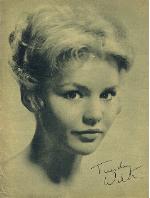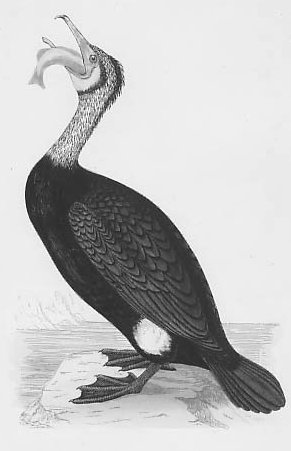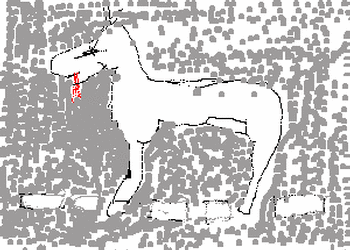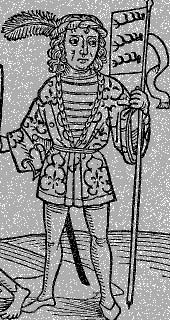Further to my legendary L'Oreal letter (see Career Change, 6th May), I have received this:
Frank, I found this mysterious message scrawled on an irregularly shaped, singularly corroded sheet of metal which fell into my garden last night. BD*
Dear Mr Key, It has been brought to my attention that you have shown interest in the possibility of becoming “the New Face” of L'Oreal. Being a very busy man - especially now that this so-called “Scandal of the Implausable Utensils” has surfaced - I have not yet had an opportunity to gaze upon your facial assets, if any, with my own eye. Yes my friend, you read that correctly; I said “eye”… for I possess only one. It was not always so. Please, please…spare me any demonstrations of pity or remorse! For it was of my own volition some decades ago that the organ, with its once inquisitive gaze, was spirited away to a particle physics research station of admittedly debatable repute where it is now lodged in a special calcium-lined retort, subjected to occasional light bombardments of energetic particles (the nature of which are distinctly open to criticism) whenever the thin, stooped, superannuated lab assistant can wrench himself away from his perpetual travail; the ultimate worth of which is certain to be slight. As interesting as I am sure you would find more biographical information about myself: enough! In order to be considered for employment as New Face, one must be handsome and clean-shaven; any attempt to disguise singular hairiness or structural abnormalities by the application of unguents or poultices, no matter how clever of a manner one may imagine them to have been applied, shall be cause for immediate dismissal. The last applicant who attempted to pull this little stunt I dismissed with a sudden volley of sharp, guttural barkings and unearthly bleatings, whilst contorting my typically mobile features into a stiff, sarcastic grimace. He, waving his hands in the air, muttering some airy-fairy quasi-occult philosophical gibberish, turned and left the nitre-encrusted chamber, NEVER TO BE SEEN AGAIN!
The man with the hammers, the man with the flags. He has a second pair of shoes. He bought them in Blister Lane, he had them repaired. His head is the same size as two of anyone else's head, or a few pounds of oranges, plums, or other fruit. It will take years. Once he had decided to paint his ship with stolen paint, he could not look back. The ship, when painted, would be burnt sienna in colour, stains apart. What a long ship it was, and is, and will be. It had sailed from shore to shore. He held sway at the helm, and on deck. He spat plum stones into his flask. Much later, he knew, they would be crushed, liquefied, in his blender, in his kitchen, in his other hut, the hut he had built at the docks, for those mornings when he did not set sail on his ship to reach some other shore, where he had other huts. In weather so suitable for breakfast on a lawn, eighteen bowls of Special K and a jellied, jellied eel, he would ram the oars home, force them into the muck, so they were perpendicular, not far away from the tallest of the six trees, which were poplars, or larches, or even yews. Oars fixed in place, he will paint them, the oars, with the delicate bristles of his Coddington brush. Its wooden handle has seen better days, particularly the days in Jutland, Scheveningen, Reykjavik, other landmarks of or near Scandinavia. Those were the days before he was pulled towards the seas. Who pulled him to the seas? Who made his flag? Who made his shoes? Ah, that I cannot say, not yet. The kettle maps were stacked in a rough wooden crate. The crate had been painted. Butter had been kept in this crate, butter used in the sandwiches he had eaten at half-time in all those polevaulting or archery competitions he had entered. They had struck a medal for him, he was so keen. He had lost the medal. It was zinc. It had fallen out of his pocket in March. Deep snow lay on the ground. He remembered the day well, because he had to, it was Potato Day! The village wrestler, the one with the goitre, had a big iron pot of gruel and slops, as he always did. No one knew how old he was, but his birthday parties were marked by rectitude and spasms. He was extremely tall, he had to stoop to enter his own house. It was a squalid house. It stank of vinegar. This wrestler was wont to sing remarkable songs as he sat on the jetty, dangling his feet in the brackish water. For many years he had tended his broken nose, applying a new set of bandages every day. He used bright red bandages, having smeared them first with ink or ointment. The bottles were identical, and kept on the same shelf. The shelf was made of plastic, but it sloped towards the left. Nothing heavier than two small bottles or some corks could be kept on it. He brushed his hair. The lake was hidden by trees, a mile away from Haemoglobin Towers. For a thousand years, the lake looked blue. One day, when he was famished, he swam there, he wore water-wings, rubber ones, and yellow. He had to inflate them with his perfumed breath. It took all morning. By noon he was exhausted. Later, stealthily, he crept by torchlight to the moorings. They had been varnished, so thoroughly that he slipped and fell. No bones were broken. But Pang Hill was no longer his home, nor could it ever be so, not while he wore such preposterous trousers. Eating jam by the spoonful, he watched the branch give way. It fell to the ground. He was wearing tiny sandals, three sizes too small. The stitching was coming loose on both of them, and not before time. The man with the clarinets had arrived. He sprang to his feet, on legs. They mucked about with each other's pencil sharpeners all day. An ailing vulture circled overhead. It had splendid musculature, or thought it did. Below, on the pebbles, they donned skindiving equipment. The pub was shut. The landlord had rouge ears underneath his hair. He carried a selection of bats, pails, needles and vicuna nets. These he patted with yearning. His one foot was shod in an enemy's shoe. A token of combat. It had a vulgar reek, but squashed ants and earwigs on the paving slabs with the best of them. This was called HACK-SLOT B. It meant so much, or it meant nothing, he was not sure. Long ago he had become entangled in the waterlogged corridors of the Big Damp Building, and now there was no escape. The magnificence of it was breathtaking. It had taken centuries to build, but only last year was the tin bath warehouse added on. He spat in it, and kept on spitting, he was unable to stop himself. Feathers sprouted, but did not grow. They were spindly and vicious. He could no longer remember how to speak Hungarian, if he ever knew. His boxer shorts were blue, from Budapest. There is a reason for everything, but not for food. Food must be speared with big tin forks. Or so he thought. He poked at the plankton with his fork. The plate had been smashed, it was in bits on the linoleum. He intended to take up athletics. They would wrap him in flowers and other greenery, and all because he had ruined his crayons when he was a tot. He was wicked, wicked, and he went on a cruise. The cruise took him north. Then it took him west. He was not sure which coinage to use. He had some change in his little pockets. It weighed so much, he had to trudge. After careful planning, he set fire to all the maps. He put the cartons to one side. They would be useful to him later on, if at all. But it was time to hold a grudge. He lighted upon a fishmonger, and rapped him on the nose with a fountain pen. Maroon ink spurted out on to the fishmonger's mouth and chin. He had lockjaw and some pianos. Where did he keep his pianos? They sent a detective to find out. One day, he would brandish despicable wooden things inside his tent. It was a famous tent, but age had frayed it. It was decorated with a boa constrictor motif, lacquered in mauve. He came upon it on a mountain top, he hurled it into a sand pit. His skull was perfectly formed and bright blue. There had been much talk of this in thousands of corridors and on horseback. All the fruit had been chewed. He checked his dictionary for errors. Under B he found plenty. He pasted them up, threw back his head, extricated some tacks from the hardboard, and shoved them into an envelope. This was stylish. He sat by the big clock. His sister arrived. She was an emigree. She buried three or four pelicans or yaks near a factory. That had to be the factory. This must be an ambulance! Its bleepers are off-pitch and ungodly. Bundled inside a blanket, she sported a mask, half of it carved out of mahogany and the rest out of something metallic. Delicate traceries of bip lay smeared on the gasworks, for this was Raymond's village. His dubbin was better than the rest. He had come this far, and had no sandwiches left. He was in agony. Darning the beekeeping outfit had been no laughing matter. The reek of sandalwood and lavender was in the air. He was penniless. Wearing an altimeter instead of a wristwatch, he careered along the towpath of the canal. The Immersion Man was on his way.








